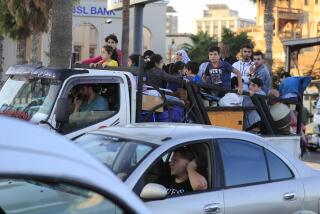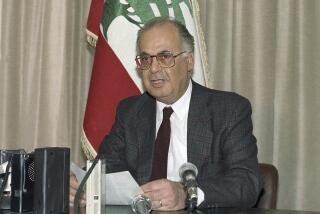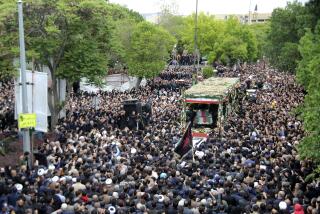Lebanon Factions Join in Mourning Premier
NICOSIA, Cyprus — Lebanese Muslims and Christians closed their shops and schools Tuesday in a nationwide strike to express their outrage at the assassination of Premier Rashid Karami.
The minister of education, Salim Hoss, who is a Sunni Muslim as Karami was, agreed Tuesday to serve as premier for an interim period.
President Amin Gemayel appointed Hoss to the post only hours after Karami was killed by a bomb that exploded on board his helicopter Monday. Hoss, after meeting with Gemayel, told reporters that he hopes his time in office “won’t last long.”
He said he told the president, who is a Maronite Catholic, that the government must take steps to deal with Lebanon’s economic and social collapse.
“There have to be measures taken,” he said, “on these two scores: first the political reforms to be concluded through the talks under way in Damascus, and second the steps to be taken internally in order to rectify the deteriorating economic and social situation.”
Pro-Syrian Views
Hoss, 57, was premier from 1976 to 1980. He is, as was Karami, a supporter of Syria’s intervention in Lebanon as a means of controlling militia anarchy.
Muslim politicians in Lebanon oppose Gemayel because of his veto of Syrian-sponsored efforts to achieve political reforms aimed at ending the 12 years of factional fighting that began with Lebanon’s 1975-76 civil war. Many Christians believe that the reforms demand too many concessions.
Hoss noted that Karami had submitted his resignation to Gemayel on May 4, frustrated at the growing political and economic chaos in the country. Hoss said Gemayel should follow Karami’s wishes and change the Cabinet.
“I will not be a premier in this situation,” Hoss said. “The loss of Karami cannot be compensated for in Lebanon or in the Arab world. All we can do is finish what he was doing for the benefit of the country.”
Lebanese officials said two separate investigations are being undertaken in an effort to determine who placed the bomb on Karami’s Puma helicopter Monday.
Interior Minister Abdullah Rassi, who was wounded when the bomb went off, said he believed that the explosive device was placed on the aircraft at an army base before Karami boarded it in the northern city of Tripoli.
Reporters in Beirut noted that army helicopters are usually based at a stadium in the Christian port of Juniyah, about 12 miles north of Beirut.
Mourners Pay Respects
At the entrance to Tripoli, the port city that Karami had represented in Parliament since 1951, there was a huge black banner with the words “Tripoli Mourns Its Son.” Syrian troops were out in force as hundreds of mourners filed past Karami’s coffin.
Women wailed with grief, and men of the predominantly Sunni city paid their respects to Karami’s brothers.
“He was a father to Tripoli,” the Reuters news agency quoted a Tripoli elder as saying. “When we know our foe, we will settle accounts.”
Throughout Lebanon, schools, shops and offices were closed in a rare display of unity. Flags were lowered to half staff in most of the country, a testament to Karami’s popularity. Unlike most Lebanese leaders, Karami had no organized militia following.
There is to be a state funeral today for the 65-year-old politician.
Syria Declares Mourning
In Syria, three days of official mourning were declared for Karami, who was regarded as the most ardent supporter of Syria’s policy in Lebanon.
“The nationalist line followed by Karami will remain the line followed by every Lebanese and Arab,” the Syrian Cabinet said in a statement.
The Syrians accused Israel and its agents in Lebanon of being behind Karami’s assassination.
In Tel Aviv, Israeli Prime Minister Yitzhak Shamir said his government “has no connection” with the killing.
More to Read
Sign up for Essential California
The most important California stories and recommendations in your inbox every morning.
You may occasionally receive promotional content from the Los Angeles Times.










